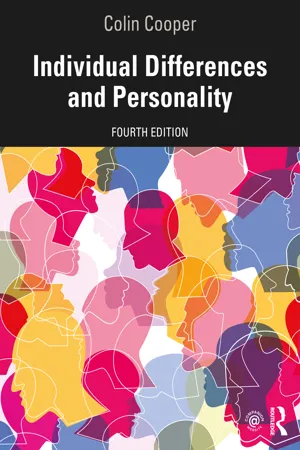
- 532 pages
- English
- ePUB (mobile friendly)
- Available on iOS & Android
Individual Differences and Personality
About this book
Individual Differences and Personality provides a student-friendly introduction to both classic and cutting-edge research into personality, mood, motivation and intelligence, and their applications in psychology and in fields such as health, education and sporting achievement.
Including a new chapter on 'toxic' personality traits, and an additional chapter on applications in real-life settings, this fourth edition has been thoroughly updated and uniquely covers the necessary psychometric methodology needed to understand modern theories. It also develops deep processing and effective learning by encouraging a critical evaluation of both older and modern theories and methodologies, including the Dark Triad, emotional intelligence and psychopathy. Gardner's and hierarchical theories of intelligence, and modern theories of mood and motivation are discussed and evaluated, and the processes which cause people to differ in personality and intelligence are explored in detail. Six chapters provide a non-mathematical grounding in psychometric principles, such as factor analysis, reliability, validity, bias, test-construction and test-use.
With self-assessment questions, further reading and a companion website including student and instructor resources, this is the ideal resource for anyone taking modules on personality and individual differences.
Tools to learn more effectively

Saving Books

Keyword Search

Annotating Text

Listen to it instead
Information
Chapter 1
Introduction to individual differences
Introduction
- ● Discuss why it is important to study individual differences, and how it differs from other areas of psychology.
- ● Outline how individual differences may be discovered.
- ● Appreciate why it is necessary to determine how people vary ('structural models') and the lower-level processes which cause these variations to occur ('process models') to have a proper understanding of individual differences.
- ● It is of interest in its own right. Most of us believe that personality, intelligence and so on are important characteristics of people when making friends and seeking partners – perhaps enduring music which we dislike, boring parties and dating apps rather than simply marrying the person next door. But how should we conceptualise their personality? What characteristics of a person should we look for?
- ● Psychological tests are useful in applied psychology. The study of individual differences almost invariably leads to the publication of psychological tests. These measure abilities, knowledge, personality, mood and many other characteristics. They are of immense value to educational, occupational and clinical psychologists, teachers, nurses, careers counsellors and others who may want to diagnose learning difficulties, dyslexia or outstanding mental ability or seek to assess an individual’s suitability for promotion, level of depression or suitability for a post that requires enormous attention to detail. The proper use of psychological tests can thus benefit both society and individuals.
- ● Tests are useful ‘dependent variables’ in other branches of psychology. Psychologists make extensive use of psychological tests when conducting experiments. A clinical psychologist may suspect that feelings of hopelessness often lead to suicide attempts. In order to test this hypothesis, it is obviously necessary to have some way of measuring hopelessness and by far the simplest way of doing so is to look for an appropriate psychological test. Cognitive psychologists studying the link between mood and memory (‘state dependent memory’) must be able to assess both mood and memory in order to be able to test whether a particular theory is valid and so they need sound mood questionnaires and tests or experimental tasks measuring memory.
- ● Other branches of psychology can predict behaviour better when they consider individual differences. Other branches of psychology rely on broad laws to predict behaviour, for example ‘behaviour therapy’, in which the principles of conditioning are used to break some undesirable habit. The therapist may know that a certain percentage of his or her patients may be ‘cured’ by this technique, but is unlikely to be able to predict whether any one individual is more or less likely than average to benefit from the therapy. However, it might well be found that the effectiveness of a particular type of treatment is affected by the individual’s personality and/or ability – a treatment that is successful in some individuals may be much less successful in others. By taking such individual differences into account, statistical tests become more sensitive. Instead of using analysis of variance to determine whether patients who are given behaviour therapy for a particular problem tend to show fewer symptoms than those who are assigned to a control condition, it is far better also to measure relevant personality and ability traits. One can then perform what is known as an ‘analysis of covariance’ instead. This shows whether the personality and ability traits are related to the number of symptoms shown and whether the two groups differ in the number of symptoms shown. It can show whether individual differences and/or the experimental condition influence behaviour.
Main questions
How can we discover individual differences?
Clinical theories

Studying individuals in detail

Armchair speculation
Scientific assessment of individuals using mental tests
Table of contents
- Cover
- Half Title
- Title Page
- Copyright Page
- Dedication
- Contents
- Preface
- 1 Introduction to individual differences
- 2 Personality by introspection
- 3 Measuring individual differences
- 4 Depth psychology
- 5 Factor analysis
- 6 Broad trait theories of personality
- 7 Emotional intelligence
- 8 Reliability and validity of psychological tests
- 9 Narrow personality traits
- 10 Sub-clinical and antisocial personality traits
- 11 Biological, cognitive and social bases of personality
- 12 Structure and measurement of abilities
- 13 Ability processes
- 14 Personality and ability over time
- 15 Environmental and genetic determinants of personality and abilities
- 16 Psychology of mood and motivation
- 17 Applications in health, clinical, counselling and forensic psychology
- 18 Applications to education, work and sport
- 19 Performing and interpreting factor analyses
- 20 Constructing a test
- 21 Problems with tests
- 22 Integration and conclusions
- Appendix A Correlations
- Appendix Β Code of fair testing practices in education
- Author Index
- Subject Index
Frequently asked questions
- Essential is ideal for learners and professionals who enjoy exploring a wide range of subjects. Access the Essential Library with 800,000+ trusted titles and best-sellers across business, personal growth, and the humanities. Includes unlimited reading time and Standard Read Aloud voice.
- Complete: Perfect for advanced learners and researchers needing full, unrestricted access. Unlock 1.4M+ books across hundreds of subjects, including academic and specialized titles. The Complete Plan also includes advanced features like Premium Read Aloud and Research Assistant.
Please note we cannot support devices running on iOS 13 and Android 7 or earlier. Learn more about using the app